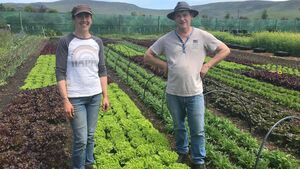Clotilde Kiely wants you to care about vegetables

Clotilde Kiely (left) on her farm
I always assumed farming was something you were born into. Certainly, all the farmers I know, knew they would be farmers before they knew how to write their own names. Farming was something atavistic, pre-ordained, and most importantly, something you inherited, not something you chose.
I didn’t realise how wrong I was until I met Clotilde Kiely.
Clotilde Kiely came to Waterford from France in 2001 when she was 20 years old. She does not come from a farming background. In fact, she grew up in a city and was the daughter of two scientists.
She came to Ireland to learn English and ended up working with a horse trainer. She worked in various businesses in Waterford city, including Dawn Meats, she fell in love and married a local butcher, Pat Kiely (whose shop is still on Micheal Street). She had children and settled into her life.
But never gave up on her dream of becoming a farmer.
It seems an odd dream, but for Ms Kiely, and other small food producers it is akin to a vocation.
She said: “Despite the luxury, despite all the other cool things you can do, at the core of everybody is this need for food.”
In 2016, her mother passed away, leaving her with an inheritance. She decided it was time to take the risk.
“Giving my kids good, local food in season became really important.”
Beginning with a poultry farm and then transitioning to vegetables, Comeragh Mountain Farm was born.
Ms Kiely sells her vegetables at the farmers’ markets in Dungarvan and Tramore. Various restaurants in West Waterford buy from them also.
She doesn't mind that it is a small operation.
“We are not in competition with supermarkets in that we offer a completely different product: our produce is high quality, nutrient rich and locally grown.”
Ms Kiely's produce is grown in a ‘living soil,’ making it rich in microbiome.
Besides, large-scale producers have their own problems.
“They have a lot of volume to sell and they can only sell it to supermarkets.” The supermarket could have four different producers all trying to sell their large quantities of one crop, so the supermarket can slash the price of the food.
“It’s very hard to get rid of three hundred heads of broccoli in one week.”
Supermarkets are not paying “the true cost” of the vegetable.
Being French has “definitely” influenced the way Clotilde thinks about food.
“It’s not that the French are better or the Irish are bad, it's about the history of our countries. We had the time and leisure in France to develop the way we would make our food according to our landscape. In Ireland, with historical hardship, that was never possible.”
Although it might seem that food providence is becoming more popular in Ireland in recent years, Clotilde pointed out that, “thirty years ago, everything was local".
“There’s more and more awareness but we still cater for a minority. Most people are interested in convenience than in food," she said.
According to Ms Kiely, small local producers are contributing to Ireland's 'food sovereignty'. This is the idea that each country should be able to feed itself without relying on imports.
Ms Kiely summed it up well when she asked: “What’s the point in buying potatoes from Spain?”
“We should focus on feeding localities.
“The global food production system produces poor-quality food.”
For Christmas, they will have seasonal, local vegetable boxes available for collection in Dungarvan and Tramore. They also do farm tours where you can actually see how local food is produced. To organise these, you can email Clotilde at comeraghmountainpoultry@gmail.com






